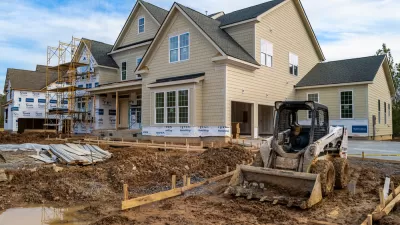All forms of public decision-making are subject to controversy and competing expectations. Many of these relate to the perceived utility gained -- or disutility incurred -- through public expenditures.
All
forms of public decision-making are subject to controversy and competing
expectations. Many of these relate to the perceived utility gained -- or
disutility incurred -- through public expenditures. As economist Nathan Berg
showed in a 2002 paper, public decision-making processes are largely exercises
in behavioral economics. Berg isolates
five dominant tendencies:
The
status-quo effect: people are willing to pay a limited amount for something new (i.e., a neighborhood park), but want to be compensated to a far greater extent for something perceived to be lost. Berg argues this leads to a tendency to prefer things the way they are;
Loss
aversion: A willingness to accept a minimal chance of future loss (i.e, 1,000 deaths from a nuclear power plant accident) but an unwillingness
to pay more to avoid gravely disastrous consequences (upgraded safety technology to avoid 10,000 deaths);
Overconfidence:
a systematically mistaken distortion on the part of consumers about the demand
for a public good (e.g., everbody drives); and
Hyperbolic
discounting: people are impatient in the short-run but ironically patient in
the long-run (I want this new car now...I'm sure they'll come up with a replacement for oil someday).
Given such tendencies, we can see that planners must contend with a wide
range of public expectations – some of which may be based on wholly mistaken
assumptions.
But this shouldn't surprise us: after all, we're programmed
for error. It's what makes us human. So argue Michael and Ellen Kaplan in their
fascinating new book, Bozo Sapiens: Why to Err is Human. It provides some
interesting insights into why public economic behaviors as described by Berg
are so common.
Much like Malcolm Gladwell's 2005 title Blink, Bozo Sapiens
explores the complex processes behind our judgments and decision-making, but
shows how our tendencies towards error are actually hard-wired into our genes.
The Kaplans (a mother-and son writing team whose previous collaboration was
Chances Are: Adventures in Probability [2006]), argue that those very visual
and mental faculties that favored survival in a state of nature can also lead
us astray in a world grown unimaginably more complex.
The authors have woven together hundreds of scholarly
studies from a wide range of disciplines. What emerges from their analysis is
that we all struggle to fill the gap between what we know is true and what we
feel to be so. More often than not, we rely on intuition and other shortcuts
when the evidence is thin – or, indeed, when it argues against our beliefs.
We are cognitively programmed to classify, aggregate and
summarize – in short, to simplify -- what we see and hear. Otherwise, we would
be overwhelmed and unable to judge what information is important and what is
not. Unfortunately this makes us susceptible to illusion and to miss entirely
what is really going on. For an illustration, the authors cite a famous study
that readers can replicate themselves on YouTube.
As well, our various rules-of-thumb based on experience that
we employ to make decisions can lead us "off the rails", sometimes disastrously
so. Worse, when we are motivated to believe something to be the case, we
selectively check the available evidence to fit our beliefs.
The authors argue that these and other paths to error can be
traced back to our evolutionary roots. We are, as they put it, "fresh off the
Pleistocene Bus" and have not evolved appreciably since the days of our
genetically identical cave-dwelling ancestors.
A particular fault arising from our classificatory efforts,
according to the Kaplans, is our need to separate ourselves from a convenient
"them," sometimes through suspicion, racism and xenophobia, with predictably
terrible consequences. In an especially compelling example, the authors relate
a study in which individuals identified by the researchers as "right-wing
authoritarians" would be willing, if asked by the government, to repress and
arrest any threat to its authority – including other right-wing authoritarians
such as themselves!
In this light, NIMBY-ish responses to proposed developments
that might bring new social groups into a neighborhood should not surprise us.
What elevates Bozo Sapiens beyond popular science interest
is that it connects our faulty reasoning to troubling real-world social
conundrums -- such as our tendencies towards racial prejudice and our apparent
inability to stop ourselves from destroying the planet.
While
we might all be tempted to believe -- along with Oscar Wilde's Lord Goring in
An Ideal Husband -- that "falsehoods [are] the truths of other people," Bozo
Sapiens dispels any such comforting thoughts. It is well worth reading, and
makes some of the economic behavior exhibited in public decision-making
processes much more understandable.

Alabama: Trump Terminates Settlements for Black Communities Harmed By Raw Sewage
Trump deemed the landmark civil rights agreement “illegal DEI and environmental justice policy.”

Planetizen Federal Action Tracker
A weekly monitor of how Trump’s orders and actions are impacting planners and planning in America.

The 120 Year Old Tiny Home Villages That Sheltered San Francisco’s Earthquake Refugees
More than a century ago, San Francisco mobilized to house thousands of residents displaced by the 1906 earthquake. Could their strategy offer a model for the present?

Opinion: California’s SB 79 Would Improve Housing Affordability and Transit Access
A proposed bill would legalize transit-oriented development statewide.

Record Temperatures Prompt Push for Environmental Justice Bills
Nevada legislators are proposing laws that would mandate heat mitigation measures to protect residents from the impacts of extreme heat.

Downtown Pittsburgh Set to Gain 1,300 New Housing Units
Pittsburgh’s office buildings, many of which date back to the early 20th century, are prime candidates for conversion to housing.
Urban Design for Planners 1: Software Tools
This six-course series explores essential urban design concepts using open source software and equips planners with the tools they need to participate fully in the urban design process.
Planning for Universal Design
Learn the tools for implementing Universal Design in planning regulations.
Clanton & Associates, Inc.
Jessamine County Fiscal Court
Institute for Housing and Urban Development Studies (IHS)
City of Grandview
Harvard GSD Executive Education
Toledo-Lucas County Plan Commissions
Salt Lake City
NYU Wagner Graduate School of Public Service






























